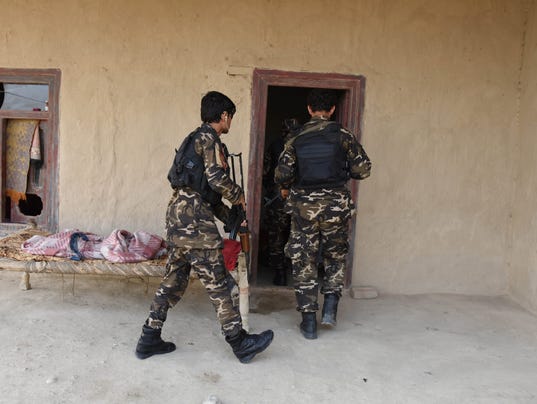Strict Standards: Only variables should be assigned by reference in /home/noahjames7/public_html/modules/mod_flexi_customcode/tmpl/default.php on line 24
Strict Standards: Non-static method modFlexiCustomCode::parsePHPviaFile() should not be called statically in /home/noahjames7/public_html/modules/mod_flexi_customcode/tmpl/default.php on line 54
Strict Standards: Only variables should be assigned by reference in /home/noahjames7/public_html/components/com_grid/GridBuilder.php on line 29
President Obama's decision to delay a full military withdrawal from Afghanistan prolongs a U.S. presence in a risky conflict where victory over a determined insurgency remains elusive.
On a personal level, it means Obama will fall short of his goal of decisively ending America’s longest war by the end of his presidency. His change in policy reflects cold realities: Afghanistan’s military still needs considerable help, Taliban insurgents remain a threat and the Islamic State is emerging as a new danger in the country.
"Afghan forces are still not as strong as they need to be," Obama said in announcing the policy shift Thursday at the White House.
Obama said he would keep about 5,500 U.S. troops in Afghanistan through 2017, a reversal of an earlier plan to remove nearly all troops by the end of 2016. The 9,800 U.S. troops currently in Afghanistan will remain through most of next year.
The mission will remain the same: supporting Afghanistan’s security forces and maintaining a counter-terrorism mission aimed at al-Qaeda militants and their affiliates. But growing Taliban strength in parts of the country increases the risk that American forces will get drawn deeper into conflict.
The Taliban recently seized the northern city of Kunduz before being pushed out by Afghan forces backed by American airstrikes and U.S. advisers. It was the radical Islamic group's first capture of a major city since it was ousted from governing the country by U.S.-led forces in 2001.
Taliban forces have expanded their influence in other parts of the country, as well, threatening to seize towns and villages. "Taliban advances in parts of the country underscore the reality that this is and remains a difficult fight," Defense Secretary Ashton Carter said.
The U.S. will likely get pulled into more battles as the Taliban challenge Afghan security forces in other major cities, said Seth Jones, an analyst at RAND Corp. "That is one way I think U.S. forces are likely to be used," he said.
That's the kind of "mission creep" Obama wants to avoid — the slow expansion of U.S. involvement in the war. On Thursday, he stressed several times that U.S. forces would be limited to two "narrow" missions, counter-terrorism and guiding their security forces.
The additional American troops will allow the United States to maintain a presence on regional bases outside of the capital, Kabul, allowing them to remain closer to Afghan security forces.
Without regular U.S. air support, however, the Afghan force of 350,000 police and soldiers is struggling to secure the country. U.S. airstrikes generally are used only to protect coalition forces or the stability of the Afghan government.
U.S. officials avoid drawing comparisons with Iraq, but clearly the rapid decline in security that followed the American withdrawal from Iraq in 2011 helped shaped the White House decision.
Sectarian tensions rose in Iraq in the wake of the U.S. withdrawal, and last year, the Islamic State seized large swathes of Iraqi territory. Obama sent several thousand troops back into Iraq to help rebuild its armed forces, and the military has launched daily airstrikes. Even so, the Islamic State remains entrenched in the country.
At the time of the troop withdrawal from Iraq, which candidate Obama had promised to do, the White House said then Prime Minister Nouri al-Maliki wouldn't provide the legal protections necessary for a continued American presence.
In Afghanistan, the United States has a strong partner in the country’s new president, Ashraf Ghani, and its chief executive, Abdullah Abdullah. Both have expressed a desire for a continued American presence in the country.
Obama is counting on that close relationship to produce a better outcome in Afghanistan than in Iraq.
"In the Afghan government we have a serious partner who wants our help," Obama said.
Read or Share this story: http://usat.ly/1RJUtHw
Strict Standards: Only variables should be assigned by reference in /home/noahjames7/public_html/modules/mod_flexi_customcode/tmpl/default.php on line 24
Strict Standards: Non-static method modFlexiCustomCode::parsePHPviaFile() should not be called statically in /home/noahjames7/public_html/modules/mod_flexi_customcode/tmpl/default.php on line 54
Find out more by searching for it!

